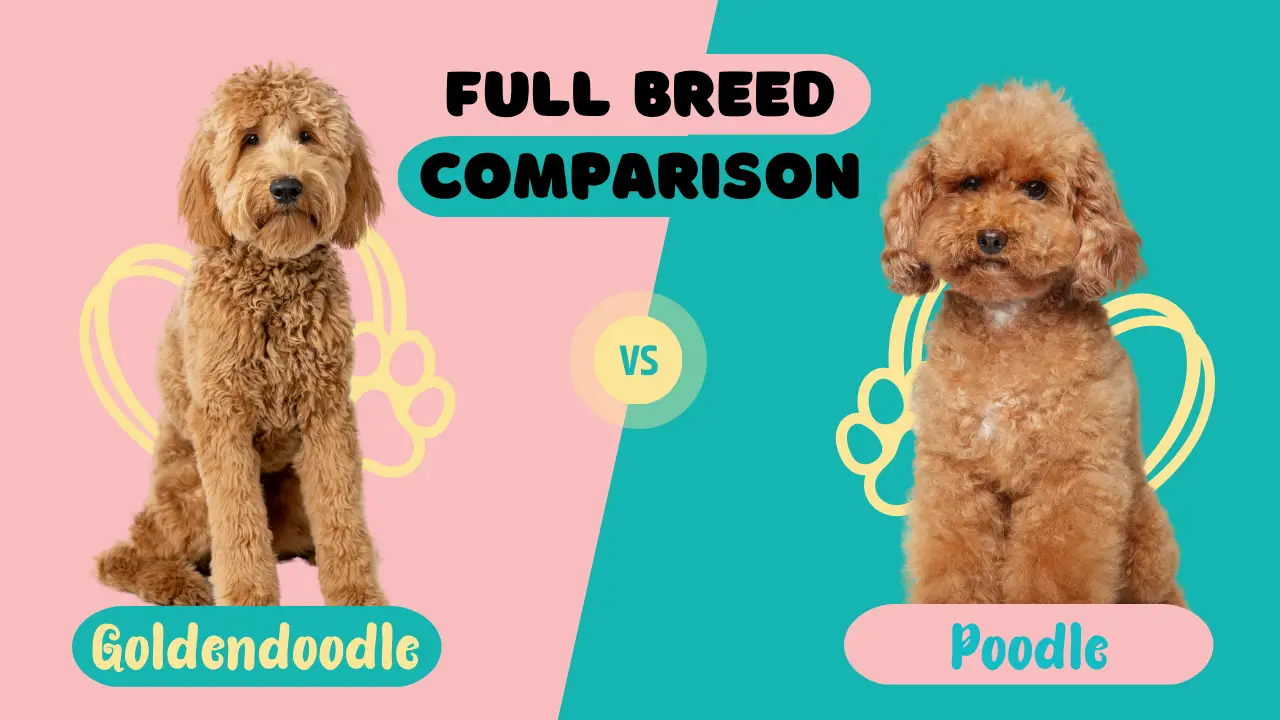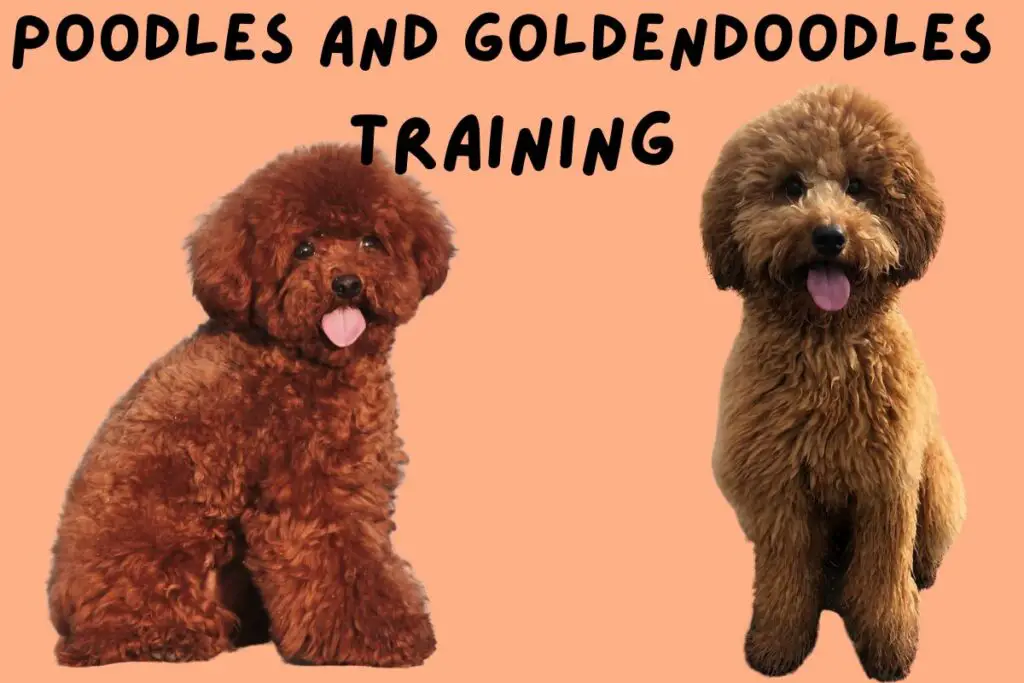Poodles and Goldendoodles are two of the most popular dog breeds in the world today. These dogs are intelligent and make great family companions. If you are thinking of getting a Poodle or a Goldendoodle, this dog breed guide will give you more insights into them and help you make the right decision.

What Will You Learn? 👇
Poodle vs. Goldendoodle Appearance
A Goldendoodle is a hybrid dog made from a Poodle and a purebred Golden Retriever. It is considered a “designer” dog. When puppies come from poodle and retriever parents, they are known as F1 Doodles. The basic difference between a Poodle and a Goldendoodle is that the Poodle is a purebred breed while the Goldendoodle is crossbred.
Most people are familiar with a Standard Poodle’s proud stance, square, shaven body or short, teddy bear trim, and moist-looking eyes. Poodles come in four sizes, including medium, but the American Kennel Association only recognizes the Toy Poodle, Miniature Poodle, and Standard Poodle.

Read our Smart Poodles - Smart Tricks eBook for only $2.99
Dive into a treasure trove of engaging tricks and tips designed specifically for your poodle!

Depending on whether it’s a toy poodle or a standard poodle, a poodle can be anywhere from 10 to 22 inches tall and weigh anywhere from 6 to 70 pounds. Their bodies are wiry and athletic. The Poodle has a tight, curly, hypoallergenic coat that doesn’t shed much. It comes in many beautiful colors, such as cream, white, apricot, gray, red, blue, and black.
The AKC says that registered Poodle puppies can be one of 12 standard colors or one of 18 other colors that are not standard.
Compared to Poodles, a Goldendoodle’s Golden Retriever parent weighs in on the larger side. This means that a female Goldendoodle whose mom or dad was a Standard Poodle can weigh between 40 and 65 pounds, while a male Goldendoodle can weigh between 60 and 75 pounds.
Due to their hybrid breeding status, Goldendoodles are a bit of a toss-up when it comes to coat texture. They might have a coat texture and length that blends both poodle and retriever. They might have a wavier coat that doesn’t shed as much. On the other hand, they can get a straighter coat with a medium length that makes them shed a lot.
It’s hard to tell what a dog’s coat will look like when you bring him home since a puppy’s full coat won’t grow in for six months.
Goldendoodle vs. Poodle Temperament and Personality
Both breeds are personable and intelligent dogs. They make great family dogs because they are patient and loving with both adults and kids. They are also playful, fun-loving, and full of energy. They’re also quick to solve problems, enjoy a stimulating environment, and are easy to train. Both the Poodle and the Goldendoodle are great at water sports and fetching because their parents were water dogs.
Personality
Even though they have a reputation for being fussy, poodles are usually more laid-back than their Goldendoodle cousins. Goldendoodles are higher maintenance and bouncier thanks to their retriever genetics.
Because the ancestors of both the poodle and the goldendoodle were bred to be water and bird dogs, they are very aware of their surroundings. Both of these breeds also respond quickly to commands.
Even though Goldendoodles are a cross between a Poodle and a Golden Retriever, the temperament and personality traits of the Poodle are still strong.
A poodle can act somewhat aloof and distant around new people. The good news is that they don’t act aggressive, but it can take some time for them to warm up to strangers.
A Goldendoodle can act wary around strangers, too, but they’re also more likely to love everyone they meet at first sight. Goldendoodles are much more social, friendly, and outgoing than poodles, who have a high-bred reserve. This is because their retriever parents gave them the retriever gene. Once they get to know you, a poodle will shower you with affection.
At the same time, Goldendoodles are quieter pets. In contrast to a Goldendoodle, a poodle will often and loudly show how it feels. Since a Golden Retriever doesn’t bark very often, it’s hard to tell if your Goldendoodle will be quiet or talkative.
Intelligence
Both breeds are a breeze to train because they are super smart and pick things up quickly. Poodles and Goldendoodles don’t tend to be stubborn or disobedient because they are aware of their surroundings, respond well to training, are friendly, and are easy to get along with.
A poodle is an excellent watchdog because it is alert, makes noise, and has a built-in alarm for stranger danger. On the other hand, Goldendoodles tend to walk right up to strangers and be very friendly, so they might not be the best choice for protecting your home.
Temperament
In general, both Poodles and Goldendoodles are peaceful dogs who enjoy attention. From people to other dogs, the Goldendoodle thrives on socialization.
Goldendoodles are not like Poodles, who are loving but a little distant. They will try to get on your lap, run to you for cuddles, and beg to be held. They can run you ragged with demands for exercise and attention, but it’s worth keeping them happy and avoiding them savaging your new couch.
Goldendoodles have an exuberant love of life and make wonderful, lively companions, whereas poodles maintain an air of dignity even while they’re having a good time.
Poodles and Goldendoodles Training
The good news is that poodles and goldendoodles are easy to train. Both respond well to commands and enjoy learning new things. You’ll want to include consistent training in your puppy’s daily exercise routine.
That’s because walking on a leash for a long time can make a puppy more likely to get hip dysplasia or other joint problems as it grows. This is because their stride on a leash isn’t as natural as it would be on its own.

Poodles tend to have better leash manners and act more reserved around people that they meet. While a Goldendoodle might want to bounce up to other dogs while you’re out, a Poodle may not enjoy playing or interacting with other dogs as an adult.
Either breed of puppy will need regular training to learn commands, how to walk on a leash, and how to sit when asked. Using a treat is a good way to reward your Poodle or Labradoodle for a training session well done.
It’s important to include socialization as part of training your dog. These dogs are friendly and social animals that also do well being left alone all day.
Taking your dog to a training class and incorporating socialization will help them learn appropriate leash etiquette and how to connect with other dogs and people.
Poodle vs. Goldendoodle Exercise
Both Poodles and Goldendoodles are active, athletic dogs with high levels of energy. These aren’t dogs that are happy just lying around the house or trotting out to sniff around the yard for a few minutes. Adult Poodles and Goldendoodles need a minimum of two hours of vigorous exercise daily.
Puppies shouldn’t be walking on a leash on sidewalks for more than 5 minutes per day for every month that they are old. So, for example, if you have a 4-month-old puppy, stick with just 20 minutes of leash walking on a sidewalk.
That’s because walking on a leash for a long time can make a puppy more likely to get hip dysplasia or other joint problems as it grows. This is because their stride on a leash isn’t as natural as it would be on its own.
Let your puppy run around in your yard without a leash to give them extra outdoor exercise time beyond the 5 minutes per day per month of age. This is an excellent way to let a puppy or older dog burn off energy, boost their health, and improve their behavior.
If you enjoy outdoor athletic activities, your dog will enjoy romping along with you. These include running, swimming, hiking, or taking your pet to do dog sports like canicross, also called urban mushing.
Poodles tend to have better leash manners and act more reserved around people they meet. While a Goldendoodle might want to bounce up to other dogs while you’re out, a Poodle may not enjoy playing or interacting with other dogs as an adult.
The good news is that poodles and goldendoodles are easy to train. You must include consistent training in your puppy’s daily exercise routine.
For poodles and goldendoodles, outdoor activity isn’t the only exercise they need. As friendly and social animals, they also don’t do well being left alone all day. In addition, since they are both highly intelligent dogs, they can get bored without sensory and mental stimulation.
An excellent way to avoid stress, boredom, and destructive behavior is to give them lots of toys that keep them occupied when not exercising. This can include puzzle toys that contain a treat as a reward. In addition, puppies will need various chew toys during indoor playtime.
Regular physical and mental exercise will keep your dog’s body fit and healthy and its mind sharp and relaxed. They’re also less likely to act out or destroy your couch when their physical, emotional, and neurological needs are met.
Poodle vs. Goldendoodle Health Problems
All pedigree dogs are prone to a few health problems, and poodles and goldendoodles are not an exception. According to the American Kennel Association, poodles tend to have more health issues than other breeds. Since Goldendoodles have one Poodle parent, they run the risk of some of these same diseases due to genetics and others due to crossbreeding. At the same time, poodles and goldendoodles are generally healthy dogs.

According to some experts, poodles are more likely to develop cancer because they are purebred. Up to 40% of poodles who die succumb to some form of cancer. Goldendoodles have an increased risk due to genetics, both from their poodle and retriever parents.
The good news is that cancer that is caught and treated early with surgery can help resolve some issues and reduce the dog’s chance of dying from cancer.
Poodles are more prone to Addison’s, VWD, sebaceous adenitis, and ichthyosis than goldendoodles.
Because the Goldendoodle is a mix of two breeds, it is more resistant to these health problems than a purebred dog. A dog can only experience these diseases if they carry faulty genes from both parents.
This means that, depending on the environment, a Goldendoodle might not get this hip disorder.
Common health issues this breed faces are:
- Hip and shoulder dysplasia
- Eye problems
- Thyroid disease
- Ichthyosis – A dry, scaly skin condition caused by a single faulty gene. A quarter of Goldens carries the defective gene. Still, only dogs with two copies (one from each parent) develop the disease.
- Cancer
On average, both dog breeds live long lives, with up to three-quarters of Poodles and Goldendoodles living past their 10th birthday. In contrast, the average dog of other breeds lives to be 11 years old.
A poodle can live 12 to 15 years, while a goldendoodle can live 10 to 15 years on average.
It’s important to know that things like illness, accidents, and the environment can change how long a poodle or goldendoodle will live. However, the good news is that it can live to a ripe old age with good care and treatment.
Poodle and Goldendoodle Grooming
When it comes to grooming, poodles and goldendoodles aren’t low-maintenance dogs. This isn’t the kind of dog that you can get away with doing minimalist grooming like an occasional brushing or bath every 2-3 months.
Both breeds need to be groomed regularly so that their hair doesn’t get tangled and cause them to start shedding. In fact, you’ll need to trim, bathe, and brush both breeds every 6 to 12 weeks to keep them at their best.
While poodles have a more high-maintenance coat, they also tend to be more hypoallergenic than goldendoodles, which is a nice trade-off, especially when it comes to shedding and allergies.
Poodles
The cut that you opt for depends on the life of the poodle and the look that you’re trying to create. Poodle coats vary by texture, length, and how much they shed. Some poodle owners shave their dogs to keep the coat short and avoid tangles from head to toe, while others have professional groomers do more stylish trims.
A poodle has hair instead of fur, which makes it grow faster and can be trickier to maintain. Use a poodle grooming brush on your dog every day to keep it from getting matted and shedding. Every two weeks or so, give your dog a bath to help him or her feel and look their best.
You can help keep your poodle’s coat more manageable and cut down on the tangles with a short, curly, and adorable teddy bear cut. These dogs can shed more in spring and autumn when their seasonal coat grown in.
Goldendoodles
With a Goldendoodle, you can generally get away with brushing at home instead of a more involved process with a professional groomer. Their coat combines aspects of both their Poodle and Golden Retriever mom and dad.
A Goldendoodle will also shed more than a Poodle due to their Golden Retriever parent’s genetics. Goldendoodles’ coats and hair can be different lengths and textures. They also shed like crazy, so you may need to vacuum more in the spring and fall when they shed their winter and summer coats.
Comb your Goldendoodle’s coat daily and give him a bath every month with a shampoo that’s designed for Goldendoodles. For either one, a pair of grooming clippers works great to get the cut right and reach difficult-to-groom areas on your dog’s body.
Both dogs will need regular nail clippings. Poodles on a 3–4-week basis, while Goldendoodles need clippings around once every 1-2 months. Check poodle and goldendoodle ears on a regular basis and clip any long or ingrown hairs that could cause infection.
If your dog has ears that hang low, this will require extra attention and upkeep to avoid contact infections. Brush their teeth every day or spread it out every week or two to prevent any dental issues. A well-groomed dog is a beautiful sight, despite their grooming needs.
Poodle vs. Goldendoodle Puppy Prices
Depending on the breeder, you can expect to pay an average of at least $1,000 for a purebred Poodle or Goldendoodle puppy.
For example, price ranges can vary based on various factors.
| Poodle puppy price | $700-$2,000 |
| Goldendoodle puppy price | $2,100-$5,000 |
It’s important to know that prices will vary based on size, desired or rare coat color, show-quality breeding, and whether you buy a dog from a reputable breeder or adopt a dog from a shelter.
Once you’ve made your choice, you’re well on your way to giving a poodle or goldendoodle puppy a new home.
Marko is the founder and author at PoodleHQ, where he blends profound expertise with formal training in Animal Behavior and Canine Genetics. With multiple generations of poodles under his care, he’s a breed connoisseur, honored with the Canine Care Excellence Award and lauded by the International Pet Enthusiasts Association.

